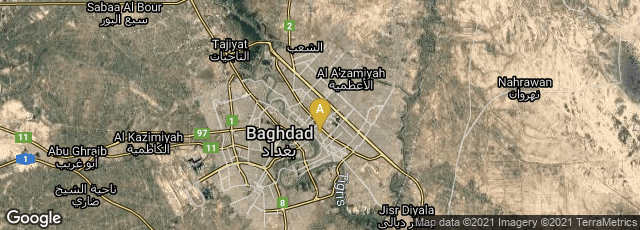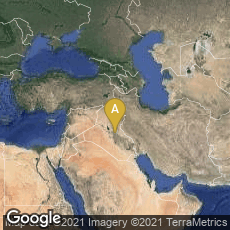

A: Baghdad, Al Saadoon Park, Baghdad Governorate, Iraq
"A century and a half of Graeco-Arabic scholarship has amply documented that from about the middle of the eighth century to the end of the tenth, almost all non-literary and non-historical secular Greek books that were available throughout the Eastern Byzantine Empire and the Near East were translated into Arabic. What this means is that all of the following Greek writings, other than the exceptions just noted, which have reached us from Hellenistic, Roman, and late antiquity times, and many more that have not survied in the original Greek, were subjected to the transformative magic of the translator's pen: astrology and alchemy and the rest of the occult sciences; the subjects of the quadrivium: arithmetic, geometry, astronomy, and theory of music; the entire field of Aristotelian philosophy throughout its history; metaphysics, ehtics, physics, zoology, botany, and especially logic — the Organon: all the health sciences; medicine, pharmacology, and veterinary science; and various other marginal genres of writings, such as Byzantine handbooks on military science (the tactica), popular collections of wisdom sayings, and even books on falconry— all these subjects passed through the hands of the translators. . . . In terms of the extent of the translated material, the enormity of the undertaking can best grasped if one were to consider that the edition of Galen's complete works by Kühn, and the Berlin Acadmey edition of the Greek commentaries on Aristotle—works that form only a small fraction of the books translated— comprise seventy-four large volumes. One can justly claim that the study of post-classical Greek secular writings can hardly proceed without the evidence in Arabic, which in this context becomes the second classical language, even before Latin.
"The translation movement which began with the accession of the Abbasids to power and took place primarily in Badhdad, represents an astounding achievement which independently of its significance for Greek and Arabic philology and the history of philosophy and science (the aspects which have been overwhelmingly studied to this day), can hardly be grasped and accounted for otherwise than as a social phenonomenon (the aspect of which has been very little investigated). To elaborate: The Graeco-Arabic translation movement lasted first of all, well over two centuries; it was no ephemeral phenomenon. Second, it was supported by the entire elite of 'Abbasid society: caliphs and princes, civil servants and military leaders, merchants and bankers, and scholars and scientists; it was not the pet project of any particular group in the furtherance of their restricted agenda. Third, it was subsized by an enormous outlay of funds, both public and private; it was no eccentric whim of a Maecenas or the fashionable affectation of a few wealthy patrons seeking to invest in a philanthropic or self-aggrandizing cause. Finally, it was eventually conducted with rigorous scholarly methodology and strict philological exactitude— by the famous Hunayn ibn-Ishaq and his associates — on the basis of a sustained program that spanned generations and which reflects, in the final analysis, a social attitude and the public culture of early 'Abbasid society; it was not the result of the haphazard and random research interests of a few eccentric individuals who, in any age or time, might indulge in arcane philological and textual pursuits that in historical terms are proven irrelevant" (Gutas, Greek Thought, Arabic Culture. The Graeco-Arabic Translation Movement in Baghdad and Early 'Abbasid Society (2nd-4th/8th-10th centuries) [1998] 1-2.)